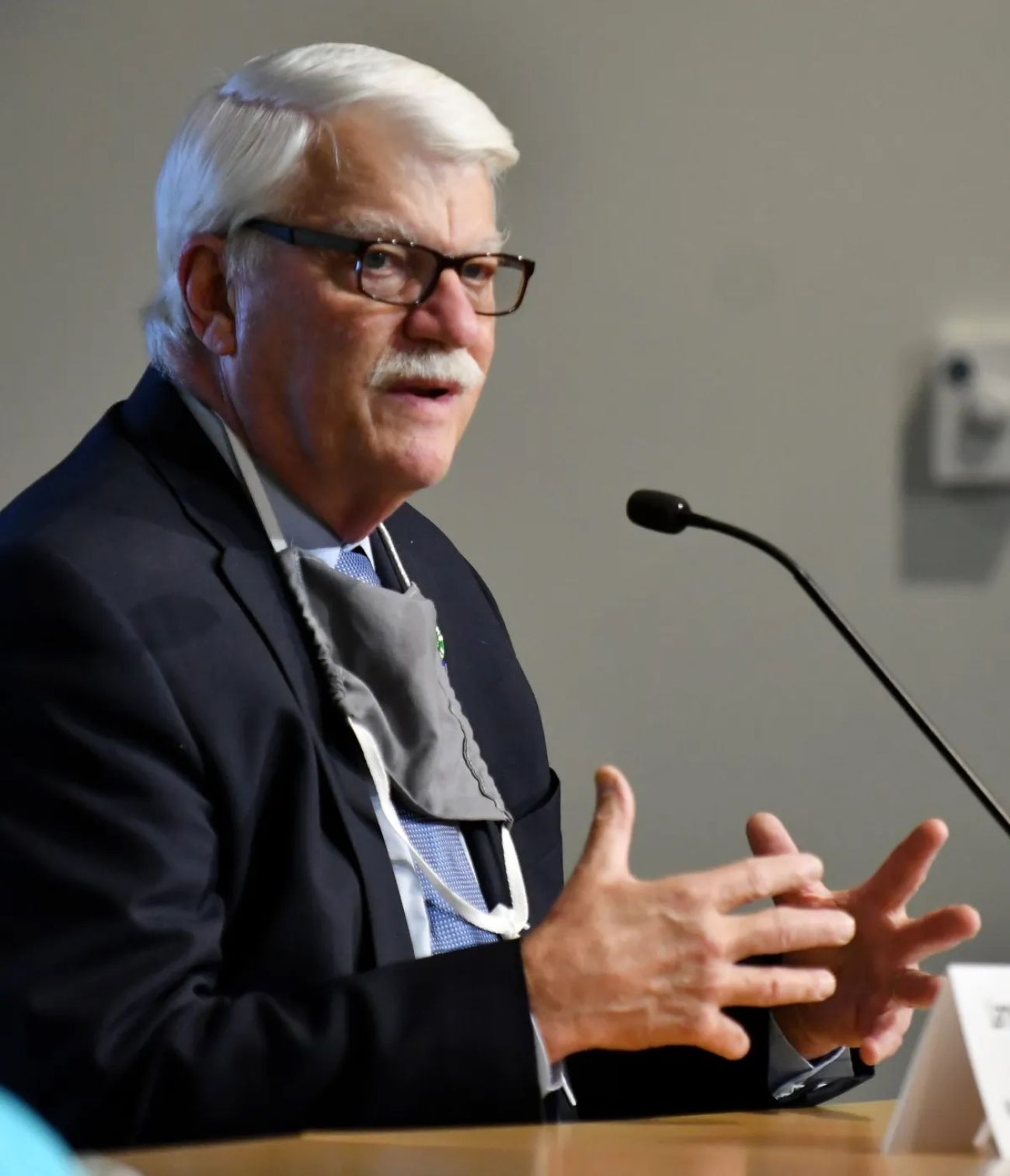AFSCME puts Michigan’s Council 25 in receivership, dismaying local officials

Michigan’s largest government employee union has been placed in receivership by its international union amid an over 50 percent membership plunge in the past decade, what some local union officials are calling a “takeover” that is creating uncertainty and confusion.
In documents obtained by The Detroit News and BridgeDetroit, American Federation of State, County & Municipal Employees International President Lee Saunders wrote on Nov. 2 to the Council 25 Executive Board that the local members with Council 25-affiliated unions would be absorbed by a new “Michigan Organizing Committee” starting on Feb. 1.
The international dissolved Council 25’s elected but mostly volunteer board and took control of the council’s local operations and finances this month following an investigation by an international union judicial panel. The elected board members remain in their paid union jobs.

Saunders said the organizing committee will provide support to the local unions, a change he said aims to increase membership and collective bargaining power after losses experienced from the anti-labor policies of Republican former Gov. Rick Snyder and raids by other unions. New Michigan labor laws that are set to take effect in 2024 are expected to improve conditions for organizing and membership, he wrote.
“It is clear to me that Council 25 does not have the personnel capacity or resources to address the internal and external opportunities that exist,” Saunders said in his Nov. 2 letter. “Experience in similar situations strongly suggests that simply providing large financial grants to Council 25 will not cure this.”
Related:
- Detroit cancels contracts with firm tied to Kwame Kilpatrick scandal
- Plagued by guns, Detroit pays neighborhood groups $10M to curb violence
- Old Detroit train site on track for national Underground Railroad network
The international appointed Gino Carbenia, a local regional director in Columbus, Ohio, as the Council 25 administrator or receiver in place of the elected board. Carbenia will “continue day-to-day operations until the organizing committee is established to ensure the business affairs of Council 25 are properly wound down,” said Sam Simon, communications director for AFSCME Michigan.
“The decision to impose an administratorship was not based on any failings on the part of the AFSCME Council 25 leadership,” Simon added in a statement.
Carbenia did not respond to requests for comment.
But heads of some AFSCME locals argue the impact on members isn’t clear and will erode trust.
One member of the 20-member executive board for AFSCME Council 25 told The News and BridgeDetroit that the board members are evaluating legal options about the move, which the international said it can make under the AFSCME Constitution. Two local union leaders said they were blindsided by the international’s decision to impose what is known in the union’s constitution as an “administratorship.”
“It’s a hostile takeover,” said Phyllis McMillon, 67, a longtime member of Council 25’s executive board. “… It’s a shutdown of Council 25.”
The international union’s claim that a new committee needs to be formed to help reverse declining membership is “utterly ridiculous,” said Vicki Lyons, president of Local 1640, which represents about 10 social service agencies, mental health and Head Start programs and has about 600 dues-paying members.
“There were no charges that could validate this takeover,” said Lyons, 69, who works full-time as president of her local.
The administrator is already changing bank accounts as well as looking at the council’s properties, leases and contractors, said McMillon, who said board members are considering legal options against the international.
The receivership makes it unclear what will happen next for members and retirees, Council 25 officials said.
“I feel like I’ve been lied to. I feel like the members who have been paying dues for years are going to be looking at them (the international) as thieves,” said McMillon, who was notified last week by international leaders that she’s no longer Region 1 vice president for Council 25’s executive board.
“You are doing the same thing the emergency manager (for Detroit) did,” she added, referring to the 2013 appointment of Kevyn Orr by the Snyder administration. “You came in and stripped everything from us. We didn’t have a say so.”
What prompted receivership
AFSCME Council 25 has experienced a steep decline in Michigan membership since 2011 when there were 48,000 members, according to Saunders’ letter. In its 2022 report with the U.S. Department of Labor, Council 25 reported having 22,921 dues-paying members, a 52 percent drop over 11 years. In addition, Council 25 President Lawrence “Larry” Roehrig announced in October that he is retiring at the end of December after 40 years with Council 25, many of them as secretary-treasurer.

In his letter, Saunders blamed the anti-labor policies of the Snyder administration for the plunge in Council 25 membership, but he also referenced attacks and “raids” by other independent unions in Michigan, naming the Technical, Professional and Office Workers Association of Michigan as “the primary culprit.”
Saunders noted the labor climate in Michigan has improved since Democrats took control of the Michigan Legislature in January. They have approved more union-friendly laws, reinstating union wage scales in public works projects and repealing the 2012 right-to-work law that barred employers from entering into a labor contract that requires private workers to pay the union a fee as a condition of employment.
The international union’s judicial panel conducted an administratorship investigation beginning in October that led to the receivership, but the panel’s findings or recommendations were not released to members nor to The Detroit News and BridgeDetroit after they were requested.
“To have an orderly wind down and transition to the Organizing Committee and to wind up its affairs, an Administratorship of Council 25, in my opinion, is necessary,” Saunders wrote to the Council 25 Executive Board. “The establishment of an Administratorship has nothing to do with the performance of the current officers or the executive board, and it is not the result of financial improprieties.”
The oversight comes weeks after Roehrig surprised union members during an Oct. 6 convention in Troy with plans to retire at the end of the year. Roehrig became president of Council 25 after a contentious election in 2016, and his current term is up at the end of 2024. He could not be reached for comment.
What the move means
AFSCME’s international leaders declined through spokespeople, Ezra Kane-Salafia and Natalia Perez Santos, to comment on how many people are affected and where else they have done administratorships.
But the international union’s administratorship actions over Council 25 could include removing officers, controlling the finances and “cleaning house,” said Marick Masters, a business professor at Wayne State University who follows labor issues.
The future “depends on what they do,” Masters said. “If they clean house, replace elected officials, then they would have to do new elections and clean up the finances of the organization depending on what happened — whether there was financial impropriety, if the money was stolen or how bad the finances are for the local — and that would also depend on how long they keep it under the administratorship.”
Emergency manager appointed
AFSCME, founded during the Great Depression, has 1.6 million members nationwide in health care, education and public sectors. Local members said they pay roughly $24 bi-weekly in dues to the union that organizes them.
Just over a decade ago, AFSCME helped to lead a voter-initiated revolt at the ballot box against Michigan’s Republican-written emergency manager law, which gave the governor and state Treasury Department broad powers to take over cities that were in financial distress, sideline the elected leaders and cancel or rewrite labor agreements.
The AFSCME-led Proposal 1 of 2012 repealed Public Act 4 of 2011, also known as the emergency manager law. Less than two months later, the Legislature sent Snyder a new emergency manager law, Public Act 436 of 2012, that still essentially allowed the appointed manager to replace elected officials in making key decisions about a city or school district.
After Detroit was declared to be in financial distress in 2013, Snyder’s administration appointed Orr as emergency manager, and he subsequently took the city into bankruptcy and made cuts in workers’ pay and benefits.
In July 2013, Detroit’s debt was as high as $18.3 billion, and 60 percent of it was tied to unfunded retired public employee pension and health care benefits. Under the “Grand Bargain” deal, the state of Michigan, philanthropic foundations and private donors of the Detroit Institute of Arts made $816 million in pledges over 20 years to reduce the pension cuts and protect DIA artworks from being sold off.
General workers endured a 4.5 percent base cut in pensions and the elimination of an annual cost-of-living increase, while the pensions of police and firefighters were left alone but an annual 2.25 percent cost-of-living adjustment was reduced to about 1 percent. A decade later, some of Detroit’s 27,000 retirees told The News the concessions reached through bankruptcy have had a devastating impact on them and their families.
Carbenia is effectively AFSCME Council 25’s emergency manager.
But the passage of Proposal 1 emboldened legislative Republicans to come back during the November 2012 lame-duck session to approve a right-to-work law, which Democrats had to wait 11 years to get wiped from the books.
AFSCME Michigan spokesman Simon said due to the growing pro-labor climate across the country, organizing opportunities have grown in Michigan, but “years of attacks from anti-union forces have taken a toll on Council 25’s capacity to organize and build power.” AFSCME international officials specifically mentioned the Snyder administration’s labor policies, including the passage in 2012 of the right-to-work law.
In his Nov. 2 letter, Saunders said internal organizing of workplaces has been a key to AFSCME’s growth in other areas of the country, “but it appears that Council 25 has not been able to adequately resource or implement internal organizing.”
The repeal of the right-to-work law, Local 1640’s Lyons said, is expected to bring union numbers back up among private employees when it takes effect next year.
“It just doesn’t smell right,” Lyons said about the receivership by the international. “It hasn’t smelled right since the beginning.”
“I want to know that there’s a reason that you came in and took my elected officials out of office. You’ve taken away my vote. You’ve taken away our voices. If they could explain that, I’d listen to it. But they can’t.”
The AFSCME international is making the change under Sections 27 and 37 of its Constitution, according to an Oct. 17 letter from Judicial Panel Chairperson Carla Insinga to Council 25’s Executive Board that set up an Oct. 25 hearing. Insinga did not respond to a request for comment.
Section 27 allows the international president, with the approval of the International Executive Board, to create an organizing committee for a local “because the existing affiliate does not have the capacity to successfully conduct” organizational and other activities.
Section 37 also empowers the international president to put a local union under receivership if any one of six conditions exist. They include if a local threatens to secede from the international or be dissolved with a “loss of funds or assets”; “deliberately filed false … financial or audit reports”; interferes publicly with an organizing campaign by another local; or violates the international’s Constitution or any order of the international president and executive board and in international president’s opinion creates an “emergency situation.”
Council 25 leader: ‘We were blindsided’
McMillon said she learned last week via letter that “effective immediately” she was no longer on the executive board that AFSCME union members had elected her to.
“We were blindsided because, as the board, we should have been (formally) notified,” said McMillon, who was in her third term.
Since 2010, McMillon also has been president of AFSCME Local 542 in Detroit, which represents 600 private and public sector workers in maintenance, fire apparatus, recreation as well as the Detroit Institute of Arts. She said current efforts are underway to try to unionize at local hospitals.
“I represent the union, so how can I face (members)? At this point, I don’t even want to go to a new hire orientation to get them to sign up to pay union dues,” McMillon said.
During the judicial hearing, international attorneys had two people testify — and neither was from AFSCME Council 25 leadership or the board, McMillon said. During a Nov. 3 special board meeting, Roehrig said he didn’t supply any other attorneys or any cross-examination “because it was not warranted,” according to meeting minutes obtained by The News and Bridge.
The receivership mirrors the process of having a state-appointed emergency manager step in, McMillon said.
“We weren’t given the opportunity to even question or ask,” she said of the council’s executive board when a vote was taken for the international to step in. And the board members haven’t received a report on the findings that led to the takeover, she said.
“Who has the report?” McMillon said. “They don’t tell us (the board) nothing.”
Michigan officials have to fight back and members are discussing legal options, she said.
“First of all, they (members) have got to speak up and tell their stories and don’t be afraid,” she said. “It’s the members that make up the union. There’s power in numbers. Call in and fill up their voicemails.”
A receivership in Florida
The situation unfolding in Michigan is similar to steps taken in August with AFSCME’s Florida Council 79. Torrence Johnson Sr., a former regional director supervising staff representatives, was dismissed from his position in August. He reapplied in September, as instructed by the international union following an administratorship, but he said he was recently denied.
Council 79 was placed under administratorship, Johnson said, following the passage and signing into law in June of Florida Senate Bill 256, which prohibits public employers from deducting union dues for “employee organizations” like AFSCME. The bill also would force a union recertification vote if the number of dues-paying members falls below 60 percent of all employees represented by a union.
Johnson estimated 35,000 members are represented in Florida, mainly state employees, municipalities and universities.
“I was management, so there was nothing I could do,” said Johnson, 57, who worked for the union for seven years. “They called it an administratorship. They said the council didn’t have any money, and with the implementation of the new Senate bill it could have an effect on funds being lost.”
International officials “were telling us it was because of the bill and that we didn’t have any funds to operate in the state — people began questioning where all the money from dues is going. When July 1 hit, not a lot of dues were coming in because you had to pay through your debit or credit (card). That was that.
“I wish we had someone down here in Florida asking the same questions” as they are in Michigan, Johnson added.
International AFSCME officials would not speak on the record about its other administratorships.
In response, Johnson said he formed a new union — the Independent Association of Public and Private Employees.
Official: It’s all about trust
Local 1640’s Lyons said the international union has said the changes won’t impact members. But it’s all about trust, she said.
In November 2018, Mervin Hawk, then-president of AFSCME Local 1640 in Detroit, pleaded guilty to embezzling funds from the local’s bank account and using about $300,000 in union monies, dues and assets for his own enjoyment, including at Detroit casinos. He was sentenced to 30 months in prison and ordered to pay restitution.
“When Mervin Hawk embezzled, we lost trust,” Lyons said.
Despite Saunders’ saying the change in oversight of Council 25 has nothing to do with finances, Wayne State labor expert Masters speculated it more than likely is.
“Usually, it’s not because they simply overspent in one particular year,” Masters said. “It’s because of some sort of misconduct. That’s why they have to go in and take it over, because they don’t rely on the current leadership to be able to do that.”
A September 2021 audit of AFSCME, found Council 25’s total assets exceeded $17 million. The majority, $13 million, is in post-retirement plan assets, $3.7 million in cash, and $190,000 in property and equipment.
According to last year’s labor report from AFSCME, Roehrig was paid $200,000 a year as president of Council 25.
Brad Manley, a union member who ran against Roehrig in 2021, said he has been asking questions since the receivership, including how dues are spent, if any corrective actions will be taken as well as copies of Roehrig’s vacation records from the judicial panel.
“For members, what’s at stake is we lost our council, the body we elected and paid money into that is supposed to go to legal arbitration cases, representation, and the staff to help you negotiate contracts,” Manley said. “What they’re saying is, you won’t have any staff reps anymore because they’ll be turned into organizers on Feb. 1.”
When Manley filed an appeal for an administrative hearing last week, he received a written response from the judicial panel stating no minutes were taken at the hearing, and the Judicial Panel does not make hearing transcripts available to members.
“We fight our employers every day. It gets the same crap that you’re doing to these people, how can you call yourself a union? We’re out here fighting our employers for livable wages, health care, and so forth. And you’re walking in telling people, ‘You’re done, … and the irony is they’re a union doing it to another union.”
The Detroit News and BridgeDetroit produced this story in partnership. Sarah Rahal reports on City Hall for The Detroit News. She can be reached at srahal@detroitnews.com. Christine Ferretti is an associate editor at BridgeDetroit and can be reached at cferretti@bridgedetroit.com.
See what new members are saying about why they donated to Bridge Michigan:
- “In order for this information to be accurate and unbiased it must be underwritten by its readers, not by special interests.” - Larry S.
- “Not many other media sources report on the topics Bridge does.” - Susan B.
- “Your journalism is outstanding and rare these days.” - Mark S.
If you want to ensure the future of nonpartisan, nonprofit Michigan journalism, please become a member today. You, too, will be asked why you donated and maybe we'll feature your quote next time!




